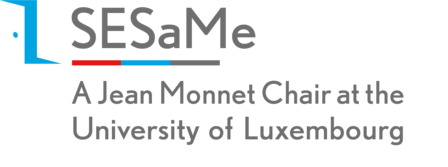Jean Monnet Chair in EU Labour Law – SESaMe

SESAME: AN OPEN DOOR TOWARDS A SUSTAINABLE EUROPEAN SOCIAL MODEL
The roadmap envisaged by the EU Commission in its Action plan on the European Pillar of Social Rights (EPSR) relies on a strong commitment to revamp a European Social Model which is truly sustainable.
Particularly with the submission of the Member states’ resilience and recovery plans, the long-term stability of social models across the EU becomes pivotal. Only a Sustainable European Social Model will thus constitute the entrance door to accompany societal transformations and grant shared prosperity and rights to European citizens.
The Jean Monnet Chair on a Sustainable European SociAl ModEl (SESAME) aims to deepen the understanding and public awareness of the main constituent elements of the European Social Model and the function of EU law and policy in their sustainable advancement. It relies on solid constitutional bases, provided by Article 3 TEU and Articles 9 and 151 TFEU, and enhances the idea of combining economic growth with social cohesion, high living standards and good working conditions. Severely weakened by years of financial austerity and labour market flexibility, and further strained by the Covid-19 pandemic, the European Social Model needs an overall relaunch, to adequately respond to future economic and societal challenges.
Luca Ratti, Associate Professor in European and comparative labour law, will carry out will carry out the SESaME Jean Monnet Chair activities at the Department of Law, Faculty of Law, Economic and Finance of the University of Luxembourg for the years 2022 to 2025.
Objectives
Objective 1: enhance the scientific analysis of the European Social Model to facilitate academic understanding of the consequences of EU social policies. This objective aims to evaluate the scope of EU labour law and social policy as well as the elements introduced by the EPSR, such as the right to adequate minimum wages and the sustainability of pension systems.
Objective 2: identify the European Social Model’s core messages in a clear and understandable coherent manner.
Objective 3: circulate the main messages on the sustainability of the European Social Model in private, public, and professional contexts. The addressees of this action will include policy makers, stakeholders and social partners, civil society associations, students, and ordinary citizens.
Methodology
The SESaMe project will assess the sustainability of the European Social Model adopting three main aspects thereof as distinct testbeds:
- The regulation of dismissal protection. How sustainable is a European Social Model which allows (or even encourages) its Member States to lower the protections against unfair dismissal?
- The regulation of wages, particularly minimum wages across the EU. How the establishment of such minimum harmonization regime on wages will contribute to foster a sustainable European Social Model?
- The regulation of social security entitlements across the EU, particularly healthcare and pensions. Will the extension of social security protections be sustainable in the medium and long run?
Events
The SESaME Jean Monnet Chair will organise 9 public lectures (3/year) on “Sustainability and the European Social Model”, where invited speakers will discuss with the Chairholder on a number of topics such as: the notion of sustainable work and its dimensions; the role of labour law in the crossroads between economic, environmental and social objectives; work-life balance as a problem of sustainability; life-cycle, labour law and social security; decent work and environmental sustainability; labour and environmental sustainability; the role of collective bargaining towards a more sustainable economic model.
 Tuesday 17 JuneConférences et séminaires, Événement en personne, Gratuit
Tuesday 17 JuneConférences et séminaires, Événement en personne, GratuitSéminaire de la Chaire Jean Monnet SESaMe – Les directives CSRD et CS3D: L'émergence contrariée d'un droit de l'entreprise durable
Learn more Wednesday 14 MayFree of charge, In-person event, Lectures and seminars
Wednesday 14 MayFree of charge, In-person event, Lectures and seminarsLecture of the Jean Monnet Chair SESaMe – Enforcing Climate Change-Sensitive Behaviours
Learn more Tuesday 11 MarchConférences et séminaires, Événement en personne, Gratuit
Tuesday 11 MarchConférences et séminaires, Événement en personne, GratuitSéminaire de la Chaire Jean Monnet SESaMe – Droit du travail et écologie : quel(s) récit(s) ?
Learn more Thursday 27 JuneFree of charge, In-person event, Lectures and seminars, Virtual event
Thursday 27 JuneFree of charge, In-person event, Lectures and seminars, Virtual eventLecture of the Jean Monnet Chair SESaMe – Towards Socio-Ecological Justice for Workers and Communities
Learn more Wednesday 27 MarchFree of charge, In-person event, Lectures and seminars
Wednesday 27 MarchFree of charge, In-person event, Lectures and seminarsLecture of the Jean Monnet Chair SESaMe – Towards a sustainable social law: emancipating social law from productivism
Learn more Tuesday 12 MarchFree of charge, In-person event, Lectures and seminars
Tuesday 12 MarchFree of charge, In-person event, Lectures and seminarsLecture of the Jean Monnet Chair SESaMe – The role of social rights in a just transition for the EU
Learn more
Resources
A reading room will be created, with the aim of letting users to familiarize with SDGs and in particular sustainability in the field of labour law and industrial relations.
Furthermore, an open access series of video podcasts, primarily dedicated to students and interested public, which will also serve as a learning tool, freely available online.
Prof. Luca Ratti, holder of the Jean Monnet Chair in European Labour Law at the University of Luxembourg, speaks with Prof. Tonia Novitz from the University of Bristol about sustainability in a labour law context, including how the 17 UN sustainability goals relate to labour law issues, current and future research topics, as well as challenges and opportunities for mainstreaming sustainability discussions into the teaching of labour law.
In this podcast, Professor Luca Ratti, Chairholder of the Jean Monnet Chair in European Labour Law at the University of Luxembourg talks to Professor Consuelo Chacartegui from University Pompeu Fabra Barcelona about the balance between harnessing the economic opportunities of the green transition and maintaining legal certainty and social justice for workers.
In Part 1 of this podcast, Professor Luca Ratti, Chairholder of the Jean Monnet Chair in European Labour Law at the University of Luxembourg talks to Prof. Paolo Tomassetti from the University of Milan and Marie Skłodowska-Curie Research Fellow within the Centre de droit social at the Université Aix-Marseille, about integrating environmental sustainability into labour law.
In Part 2 of this podcast, Professor Luca Ratti, Chairholder of the Jean Monnet Chair in European Labour Law at the University of Luxembourg talks to Prof. Paolo Tomassetti from the University of Milan and Marie Skłodowska-Curie Research Fellow within the Centre de droit social at the Université Aix-Marseille, about the particular role of labour law in the transitions towards a sustainable model.
In this podcast episode, Professor Luca Ratti, Chairholder of the Jean Monnet Chair in European Labour Law at the University of Luxembourg talks with Professor Frédéric Géa from the University of Lorraine, Faculté de Droit de Nancy, about the implication of the ecologic discourse on labour law, with a specific focus on France and its envisaged transitions towards a sustainable social model.
XXX
“Funded by the European Union. Views and opinions expressed are however those of the author(s) only and do not necessarily reflect those of the European Union or the European Education and Culture Executive Agency (EACEA). Neither the European Union nor the granting authority can be held responsible for them.”

| Conférencier : | Prof. Paolo TOMASSETTI, University of Milan and Marie Skłodowska-Curie Research Fellow at Centre de droit social, Université Aix-Marseille |
| Lieu : | University of Luxembourg Faculty of Law, Economics and Finance, Weicker Building, Room B001 4 rue Alphonse Weicker L-2721 Luxembourg |
| Date de l’événement : | lundi, 21 novembre 2022, 12:00 – 14:00 |
Abstract:
The lecture discusses how and why different energy paradigms and their political economies have affected labour and industrial relations institutions over time. It is argued that sustainability of working conditions depends largely on organised labour’s access to, and control over, the natural, energy resources on which workers’ livelihoods depend. Drawing on a novel literature that intersects energy and labour justice, the following trajectories are presented and discussed. While the possibility of labour control over the mining and distribution of coal has favoured the development of democratic institutions and welfare state in Western jurisdictions and in recently developed economies in the so-called Global South, ‘petro-capitalism’ and the political economy of nuclear energy have contributed to the dismantling of internal labour markets and to the crisis of classical labour law and industrial relations institutions. In contrast to oil and nuclear power, renewable energy sources could favour the transition from an extractive economic model to one that is generative and participatory: by democratising the political and economic power of energy, renewables might be able to better serve human welfare in a way that is compatible with ecological limits. However, the transition away from fossil fuels is not straightforward and should not be idealized. As the current energy crisis and the geopolitical turmoil demonstrate, it comes with many contradictions and distributional conflicts, imposing a reconsideration of the legal and institutional foundations of capitalism.
Link: https://bit.ly/3zzJe2b
| Conférencier : | Prof. Consuelo CHACARTEGUI, University Pompeu Fabra Barcelona |
| Lieu : | Faculty of Law, Economics and Finance Weicker Building, Room C005 4 rue Alphonse Weicker L- 2721 Luxembourg |
| Date de l’événement : | vendredi, 21 octobre 2022, 12:00 – 14:00 |
Abstract:
The term “sustainability” has a polysemic content, since it has been used from multiple and varied ideological perspectives, not always with a redistributive and ecological purpose in mind. In the sphere of the European Union, a robust discourse has also been built by the European Commission, which seeks the integration of environmental and social objectives, particularly through the actions set out in the framework of the Communication of the European Commission on the 2019 European Green Deal. The concept of “sustainability” involves a commitment linked to the concept of social justice, understood via the principles of freedom, equity, security and human dignity. In short, this notion of sustainability is based on the notion of collective social fraternity. The concept of decent work supposes the necessary labour connection with the concept of sustainability that the UN has designed, based on Goal 8 of the SDGs. The European Commission has already set out a clear vision of how to achieve climate neutrality by 2050. In this context, the Commission Communication on the European Green Deal of 2019 establishes the obligation for all legislative proposals and delegated acts to include, in their statement of reasons, a specific section to explain how this principle will be respected.Thus, the ecological transition is conceived as an economic opportunity, due to the great potential that it opens up for the creation of activities and new jobs. To ensure a full and successful transition in the European Union, it will be necessary to transform a whole spectrum of regulations. Strengthen legal certainty by setting working conditions and promoting a “foresight capacity” through strategic planning and anticipation, a holistic and proactive approach, rather than traditional enforcement mechanisms, to intensify the green foresight into legal certainty for workers. From an environmental and labour perspective, it anchors its foundations in a collective construction project. In this context, collective rights must be at the centre of such protection as one of the most important piece in the normative puzzle surrounding the green transition.
Link: https://bit.ly/3SXLBmS
| Lieu : | Faculty of Law, Economics and Finance Weicker Building, Room B001 4 rue Alphonse Weicker L- 2721 Luxembourg |
| Date de l’événement : | vendredi, 30 septembre 2022, 12:00 – 14:00 |
Introduction
Prof. Luca RATTI, University of Luxembourg, Jean Monnet Chair Holder
Keynote speech
Prof. Tonia NOVITZ, University of Bristol
Where sustainability and good governance meet – the implications for labour laws
Discussant
Eleanor SHARPSTON, former Advocate General at the CJEU
Abstract:
The European Union has for some time identified a connection between ‘sustainable development’ and ‘good governance’. Examples include the 2002 European Commission statement issued in preparation for the World Summit on Sustainable Development in Johannesburg and the title of the special incentive arrangement for the EU Generalised Scheme of Preferences (GSP+). The European Pillar of Social Rights Action Plan of 2021 titled ‘A Strong Social Europe for just transitions and recovery’ again focuses on sustainability and raises concerns regarding governance involving EU institutions, member states, social partners and civil society more broadly. Arguably, third countries, such as the UK will also be affected by the way in which sustainable development norms are incorporated into EU trade agreements, as illustrated by Article 355 of the EU-UK Trade and Cooperation Agreement. This lecture will offer a critical interrogation of what this linking of sustainability to good governance could mean from a labour law perspective.
The lecture will begin by examination of the Sustainable Development Goals (SDGs) adopted by the United Nations in 2015, considering the synergies and tensions between SDGs 8, 10, 16 and 17. The ways in which SDGs are transposed at the EU level will be considered, particularly as regards the scope of the role contemplated for collective bargaining in securing just transitions. It will be argued that good governance from a sustainability perspective entails more than the bare protection of human rights, such as freedom of association. While the importance of that basic floor of protections should not be under-estimated, further issues regarding ‘equality’ of representation and participation in decision-making call to be addressed. The aim is to explore what transformations of labour laws and the ‘social rulebook’ this might entail, alongside the mechanisms through which such changes are made.
Link: https://www.eventbrite.fr/e/jean-monnet-inaugural-lecture-tickets-415313563047